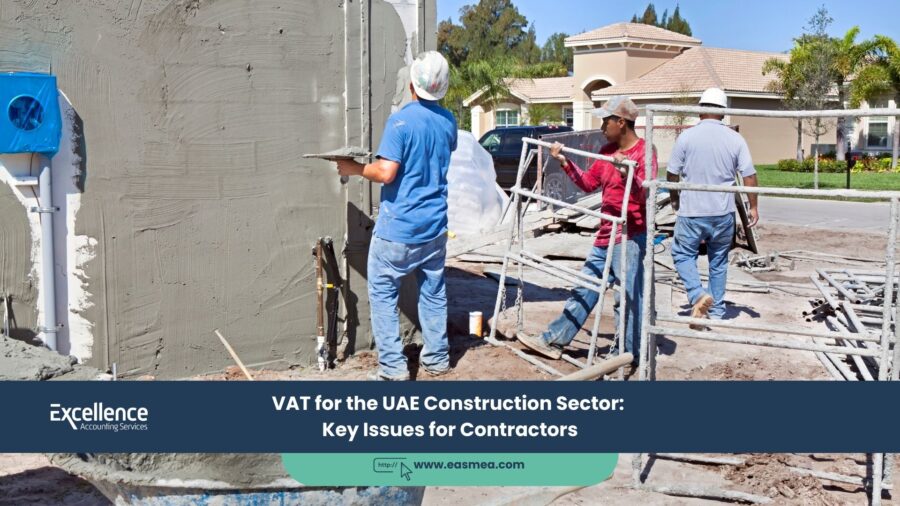A Guide to VAT for the UAE Construction Sector: Key Issues for Contractors
The UAE’s construction sector is a powerhouse of the national economy, characterized by large-scale projects, complex supply chains, and long project timelines. For contractors and subcontractors operating in this dynamic environment, Value Added Tax (VAT) presents a unique and significant set of challenges. Unlike a simple retail transaction, a construction contract involves periodic payments, retention clauses, and specific rules for different types of buildings, all of which have profound VAT implications.
- A Guide to VAT for the UAE Construction Sector: Key Issues for Contractors
- The Most Complex Issue: Determining the Date of Supply
- VAT on Retention Payments
- Zero-Rating of New Residential Buildings
- The Challenge of Mixed-Use Developments
- Building a Compliant Foundation with Excellence Accounting Services (EAS)
- Frequently Asked Questions (FAQs)
- Building a Major Project? Don't Let VAT Create Cracks in Your Foundation.
Misunderstanding these complex rules can have severe financial consequences. Incorrectly timing the recognition of output tax can create cash flow pressures, failing to apply the correct VAT rate can lead to disputes with clients, and improper input tax claims can result in penalties from the Federal Tax Authority (FTA). For construction businesses, robust VAT management is not just a compliance requirement; it’s a critical component of project profitability.
This guide provides a deep dive into the key VAT issues that contractors and subcontractors must navigate in the UAE. We will break down the complex “date of supply” rules, the treatment of retention payments, and the conditions for zero-rating new residential properties, providing the clarity needed to manage your VAT obligations effectively.
Key Takeaways
- Date of Supply is Critical: For construction contracts, the date of supply (and therefore when VAT is due) is triggered by the earlier of an invoice being issued or payment being received for certified work.
- VAT on Retention Payments: VAT is due on retention payments at the same time as the main payment it relates to, not when the retention money is finally released.
- Zero-Rating for New Residences: The first supply of a new residential building is zero-rated, but this is subject to strict conditions. Commercial buildings and subsequent sales of residential buildings are standard-rated at 5%.
- Input Tax Apportionment: Contractors working on mixed-use projects (e.g., a building with retail and residential units) must apportion their input VAT and can only recover the portion related to taxable supplies.
- Professional Guidance is Key: The complexity of construction VAT makes professional advice from VAT consultants essential for ensuring compliance and optimizing cash flow.
The Most Complex Issue: Determining the Date of Supply
For most businesses, the date of supply is straightforward. For construction, it’s the most complex area. The date of supply determines the tax period in which you must declare and pay the output VAT to the FTA. Getting this wrong can lead to penalties for incorrect tax filings.
Under a typical construction contract, a contractor submits a payment application for work completed. This is then reviewed by an engineer or consultant who issues a “certificate of work completed.” This certificate is the key document.
The date of supply is the **earliest** of the following dates:
- The date the contractor issues a tax invoice.
- The date payment is received by the contractor.
- 12 months after the work was completed (a long-stop date).
However, the FTA has clarified that for certified payments, the date the certificate is issued is a critical trigger, as it confirms the work is done and payment is due.
In practice, VAT becomes due when the work is certified and an invoice is issued or payment is received. You cannot delay accounting for VAT simply by delaying your invoice after the work has been certified.
VAT on Retention Payments
It is standard practice in construction for the client to hold back a percentage of each payment as “retention money.” This is typically released 12 months after the project is complete, once any defects have been rectified. A common mistake is to think that VAT on this retention amount is only due when the cash is finally received.
The FTA’s position is clear: the retention amount is part of the total value of the work done at that stage. Therefore, **VAT is due on the full value of the certified work, including the retention portion**, at the time the invoice for that work is issued or payment is received. You cannot wait until the retention money is released a year later.
This has a significant cash flow impact, as the contractor must pay 100% of the VAT to the FTA upfront but may only receive 95% of the payment from the client.
Zero-Rating of New Residential Buildings
This is a major relief for the construction sector but is governed by strict rules. The **first supply** (sale or lease) of a **new residential building** is zero-rated for VAT. This means no VAT is charged to the buyer, but the contractor/developer can still recover all the input VAT on their construction costs.
For a supply to qualify for the zero rate, it must meet all three conditions:
- First Supply: It must be the very first time the building is sold or leased.
- New: The construction must be completed within 3 years.
- Residential Building: It must be designed and used solely for residential purposes (e.g., apartments, villas). It does not include hotels, serviced apartments, or hospitals.
Any construction of a **commercial building** (offices, retail, warehouses) is a standard-rated supply, subject to 5% VAT.
The Challenge of Mixed-Use Developments
What happens when a contractor builds a tower with residential apartments (zero-rated) on the upper floors and retail shops (standard-rated) on the ground floor? This is a mixed-use development.
In this scenario, the contractor cannot recover all their input VAT. The input tax on general overheads and shared costs (e.g., for the foundation, structure, professional fees) must be **apportioned**. The contractor can only recover the percentage of input tax that relates to the taxable (commercial) part of the project. This requires a detailed and fair apportionment calculation, which is a complex area of VAT law.
Building a Compliant Foundation with Excellence Accounting Services (EAS)
The high value and long duration of construction projects mean that VAT errors can be extremely costly. EAS provides specialized VAT services tailored to the unique needs of the construction sector.
- Specialized VAT Consultancy for Construction: We provide expert advice on complex issues like date of supply, retention payments, and the zero-rating of residential properties.
- Contract Reviews: We can review your construction contracts from a VAT perspective to ensure the clauses are clear and minimize potential disputes or cash flow issues.
- Input Tax Apportionment: We assist with the complex calculations required for apportioning input tax on mixed-use developments, ensuring you maximize your recovery while remaining compliant.
- Cash Flow Management: As part of our CFO services, we help you manage the cash flow impact of VAT, particularly in relation to retention payments.
Frequently Asked Questions (FAQs)
The same rules apply. The date of supply is triggered by the certification of your work by the main contractor, followed by your invoice or their payment. You must account for VAT based on this date, even if the main contractor has not yet been paid by the end client.
An advance payment creates a date of supply. You must account for output VAT on the amount of the advance payment in the tax period you receive it. The tax invoice for this should be issued within 14 days of receiving the advance.
You will have to pay 5% import VAT to UAE Customs at the time of import. You can then recover this import VAT as input tax on your next VAT return, provided the materials are for a taxable supply (e.g., a commercial building). If they are for a zero-rated residential project, you can still recover the import VAT.
A deemed supply can occur if you use construction materials that you own for a non-business purpose. For example, if a contractor takes cement from their business stock to build their own private villa, they must account for output VAT on the value of that cement, as if they had sold it.
No. The zero-rating applies only to the supply of the completed building itself. The services provided *to* the developer, such as those from architects, engineers, and the main contractor, are standard-rated at 5%. The developer then recovers this VAT as input tax.
If the project is cancelled and you refund the advance payment to the client, you can issue a tax credit note. This will allow you to adjust your output tax and effectively reclaim the VAT you previously paid to the FTA.
Penalties for delays are generally considered compensation for a loss and are outside the scope of VAT. They are not payment for a supply of goods or services.
Yes, if your taxable supplies exceed the mandatory registration threshold of AED 375,000 in a 12-month period. Your supplies to main contractors are taxable supplies, even if the final building is a zero-rated residential property.
Yes. VAT is calculated on the total value of the supply, which is the price you charge your client. This price includes your costs for materials, labor, overheads, and your profit margin.
The most common and costly mistake is incorrectly timing the date of supply. Many businesses wait until cash is received to account for VAT, but the rules often require VAT to be declared much earlier (e.g., when work is certified). This can lead to significant penalties for late payment of tax.
Conclusion: Building on a Compliant Foundation
For the UAE’s construction sector, VAT is not an afterthought; it is a core component of project financial management. The unique nature of construction contracts, with their long timelines and complex payment structures, demands a proactive and expert approach to tax compliance. By understanding the key issues of date of supply, retention, and the specific rules for residential buildings, contractors can build their projects on a solid and compliant financial foundation.
Building a Major Project? Don't Let VAT Create Cracks in Your Foundation.
Contact Excellence Accounting Services for specialized VAT consultancy tailored to the UAE construction sector.




